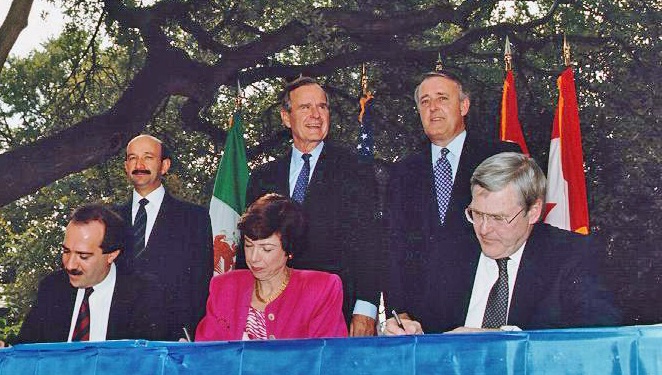NAFTA replacement yet to be ratified
April 10, 2019 | Expert Insights

The USMCA has yet to ratified by all parties, potentially making the issue an electoral captive, although immediate considerations such as tariff concerns are likely to grab airwaves.
Background
The North American Free Trade Agreement (NAFTA) is an agreement signed by Canada, Mexico, and the United States in order to establish a trilateral trade bloc in North America. Under NAFTA, tariffs were eliminated progressively, including those related to duties and quantitative restrictions, with the exception of those on a limited number of agricultural products traded. NAFTA covers more than US$ 1 trillion in annual trade.
In 2017, President Donald Trump signed an executive order to renegotiate NAFTA. He blames the treaty for the loss of American manufacturing jobs and wants major changes to the pact. Through these negotiations, the United States seeks to support higher-paying jobs in the United States and to grow the U.S. economy by improving U.S. opportunities to trade with Canada and Mexico. Eventually, President Trump and his Canadian and Mexican counterparts renegotiated the deal, resulting in the United States-Mexico-Canada agreement (USMCA) of September 30, 2018.
Analysis
Over six months after the United States, Mexico and Canada negotiated a new deal that governed NAFTA, the chances of USMCA being ratified by all three parties, is receding. The previous deal was meant to be scrapped after a year of difficult negotiations between the three nations settled on the new agreement. However, the USMCA has not quelled trade tensions in North America, a reality exacerbated by the apparent hesitancy to ratify the project.
President Trump is likely to face an uphill battle in his quest to ratify the deal through Congress, given its Democratic majority. The division between the Trump administration and the Democratic Party is at its widest, making any Trump-mandated policy unlikely to pass through Congress. Democrats, for their part, are eager to capture all of Mr. Trump’s plans, postponing them until they have another shot at the White House. If the issue continues to drag out, it is possible that NAFTA will feature among the main talking points of the 2020 presidential contest. Democrats have demanded that the USMCA make legal provisions to improve workers’ rights in Mexico, a stance actively supported by Canada. The longer the deal remains unratified, while nearing the 2020 elections, the less likely the Democrats are to join hands with the administration to ratify the deal. In addition to opposition from House Democrats, unions have voiced concerns over labour provisions in the deal. Although the negotiations regarding the deal have largely concluded, there are sticking points including arguments over tariffs. President Trump has threatened to unilaterally pull out of NAFTA, the old pact, in order to increase pressure on Congress. If this resource is undertaken, the three nations would reset their trade relations to the rules and regulations that governed it before NAFTA’s introduction in 1994.
Canada, for its part, has been embroiled in a series of domestic controversies that have demanded parliamentary attention. Current legislators only have a few more weeks to ratify the deal before the start of the summer recess in June, and officials continue to indicate that other matters are likely to demand more attention. Officials have also stated that Parliament would have little chance to deliberate ratification until 2020. Canada is scheduled to hold a federal election in October making the deal an issue of electoral consideration.
Mexico and Canada remain eager to show their seriousness relating to other tariffs that were not included in the trade agreement. The two nations have sought exemptions from global metal import tariffs imposed by the US in 2018. The metal tariffs were not included in discussions, in order to ensure that they could quickly settle on a new deal. Mexico has threatened to target US products by the end of April 2019 if waivers are not granted. This comes as Mr. Trump threatened to tariff Mexican auto exports unless Mexico makes a satisfactory effort to tackle drug trafficking and illegal immigration. Mexico has threatened to not ratify USMCA is the steel tariffs are not withdrawn. Both Canada and Mexico have threatened to place retaliatory tariffs on a host of American goods should waivers not be implemented.
As time passes, the impetus grows on each side to renegotiate a component of the USMCA that does not suit their needs. However, should one component be opened for renegotiation, it may ignite demands for other components to be renovated as well, thus lengthening the process.
Assessment
Our assessment is that with each passing day that the USMCA fails to be ratified by all three parties, the less likely the deal is to be ratified. We believe that House Democrats are unlikely to be seen as compliant with President Trump’s policies, leading them to vehemently oppose any motion he sends through the House. However, should Mr. Trump unilaterally withdraw from NAFTA, House Democrats might find themselves compelled to ratify USMCA lest an economic disaster follows. We believe that Canada is unlikely to ratify the agreement during a period of political turmoil before October’s elections in which PM Trudeau is fighting an uphill battle. We believe that Mexico is likely to take a tough position should the US not grant waivers relating to metal import tariffs. For President Trump, his campaign for re-election in 2020 is likely to prominently feature his “American First” policy, and maintaining a strong position on USMCA plays to his electoral base.








Comments